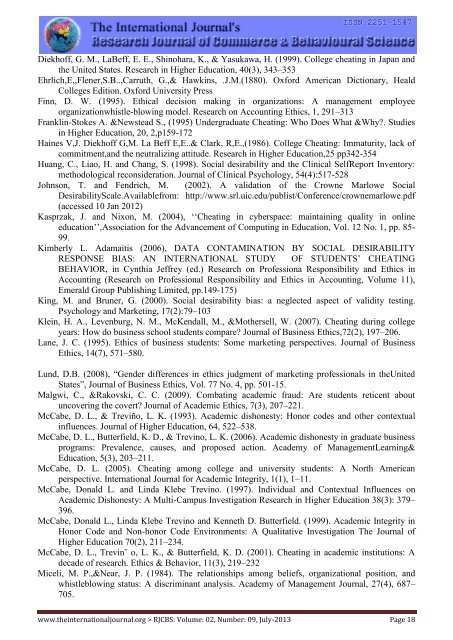Research Journal of Commerce & Behavioural Science - RJCBS
Research Journal of Commerce & Behavioural Science - RJCBS
Research Journal of Commerce & Behavioural Science - RJCBS
You also want an ePaper? Increase the reach of your titles
YUMPU automatically turns print PDFs into web optimized ePapers that Google loves.
Diekh<strong>of</strong>f, G. M., LaBeff, E. E., Shinohara, K., & Yasukawa, H. (1999). College cheating in Japan and<br />
the United States. <strong>Research</strong> in Higher Education, 40(3), 343–353<br />
Ehrlich,E,,Flener,S.B..,Carruth, G.,& Hawkins, .J.M.(1880). Oxford American Dictionary, Heald<br />
Colleges Edition. Oxford University Press<br />
Finn, D. W. (1995). Ethical decision making in organizations: A management employee<br />
organizationwhistle-blowing model. <strong>Research</strong> on Accounting Ethics, 1, 291–313<br />
Franklin-Stokes A. &Newstead S., (1995) Undergraduate Cheating: Who Does What &Why?. Studies<br />
in Higher Education, 20, 2,p159-172<br />
Haines V,J. Diekh<strong>of</strong>f G,M. La Beff E,E..& Clark, R,E.,(1986). College Cheating: Immaturity, lack <strong>of</strong><br />
commitment,and the neutralizing attitude. <strong>Research</strong> in Higher Education,25 pp342-354<br />
Huang, C., Liao, H. and Chang, S. (1998). Social desirability and the Clinical SelfReport Inventory:<br />
methodological reconsideration. <strong>Journal</strong> <strong>of</strong> Clinical Psychology, 54(4):517-528<br />
Johnson, T. and Fendrich, M. (2002). A validation <strong>of</strong> the Crowne Marlowe Social<br />
DesirabilityScale.Availablefrom: http://www.srl.uic.edu/publist/Conference/crownemarlowe.pdf<br />
(accessed 10 Jan 2012)<br />
Kasprzak, J. and Nixon, M. (2004), ‘‘Cheating in cyberspace: maintaining quality in online<br />
education’’,Association for the Advancement <strong>of</strong> Computing in Education, Vol. 12 No. 1, pp. 85-<br />
99.<br />
Kimberly L. Adamaitis (2006), DATA CONTAMINATION BY SOCIAL DESIRABILITY<br />
RESPONSE BIAS: AN INTERNATIONAL STUDY OF STUDENTS’ CHEATING<br />
BEHAVIOR, in Cynthia Jeffrey (ed.) <strong>Research</strong> on Pr<strong>of</strong>essiona Responsibility and Ethics in<br />
Accounting (<strong>Research</strong> on Pr<strong>of</strong>essional Responsibility and Ethics in Accounting, Volume 11),<br />
Emerald Group Publishing Limited, pp.149-175)<br />
King, M. and Bruner, G. (2000). Social desirability bias: a neglected aspect <strong>of</strong> validity testing.<br />
Psychology and Marketing, 17(2):79–103<br />
Klein, H. A., Levenburg, N. M., McKendall, M., &Mothersell, W. (2007). Cheating during college<br />
years: How do business school students compare? <strong>Journal</strong> <strong>of</strong> Business Ethics,72(2), 197–206.<br />
Lane, J. C. (1995). Ethics <strong>of</strong> business students: Some marketing perspectives. <strong>Journal</strong> <strong>of</strong> Business<br />
Ethics, 14(7), 571–580.<br />
Lund, D.B. (2008), “Gender differences in ethics judgment <strong>of</strong> marketing pr<strong>of</strong>essionals in theUnited<br />
States”, <strong>Journal</strong> <strong>of</strong> Business Ethics, Vol. 77 No. 4, pp. 501-15.<br />
Malgwi, C., &Rakovski, C. C. (2009). Combating academic fraud: Are students reticent about<br />
uncovering the covert? <strong>Journal</strong> <strong>of</strong> Academic Ethics, 7(3), 207–221.<br />
McCabe, D. L., & Treviño, L. K. (1993). Academic dishonesty: Honor codes and other contextual<br />
influences. <strong>Journal</strong> <strong>of</strong> Higher Education, 64, 522–538.<br />
McCabe, D. L., Butterfield, K. D., & Trevino, L. K. (2006). Academic dishonesty in graduate business<br />
programs: Prevalence, causes, and proposed action. Academy <strong>of</strong> ManagementLearning&<br />
Education, 5(3), 203–211.<br />
McCabe, D. L. (2005). Cheating among college and university students: A North American<br />
perspective. International <strong>Journal</strong> for Academic Integrity, 1(1), 1–11.<br />
McCabe, Donald L. and Linda Klebe Trevino. (1997). Individual and Contextual Influences on<br />
Academic Dishonesty: A Multi-Campus Investigation <strong>Research</strong> in Higher Education 38(3): 379–<br />
396.<br />
McCabe, Donald L., Linda Klebe Trevino and Kenneth D. Butterfield. (1999). Academic Integrity in<br />
Honor Code and Non-honor Code Environments: A Qualitative Investigation The <strong>Journal</strong> <strong>of</strong><br />
Higher Education 70(2), 211–234.<br />
McCabe, D. L., Trevin˜ o, L. K., & Butterfield, K. D. (2001). Cheating in academic institutions: A<br />
decade <strong>of</strong> research. Ethics & Behavior, 11(3), 219–232<br />
Miceli, M. P.,&Near, J. P. (1984). The relationships among beliefs, organizational position, and<br />
whistleblowing status: A discriminant analysis. Academy <strong>of</strong> Management <strong>Journal</strong>, 27(4), 687–<br />
705.<br />
www.theinternationaljournal.org > <strong>RJCBS</strong>: Volume: 02, Number: 09, July-2013 Page 18

















